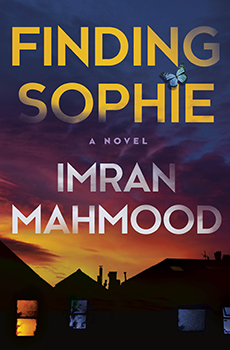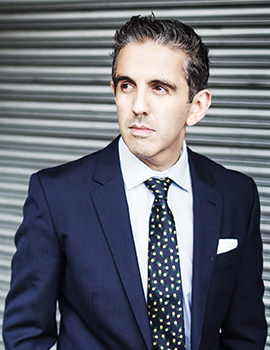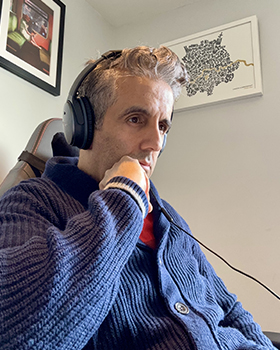

Features Imran Mahmood
The Crushing Weight of a Missing Child
The Big Thrill Interviews Author Imran Mahmood
 FINDING SOPHIE is Imran Mahmood’s fourth book published, but the first to be released in the U.S., so the book and its author have a sort of debut glow about it. As the title advertises, a missing person is the central element of the novel. But the author doesn’t go about it in the usual way, focusing more on the drama surrounding Sophie’s parents. Harry and Zara must go through the motions of living when it is evident their souls were crushed six weeks before when their child went missing.
FINDING SOPHIE is Imran Mahmood’s fourth book published, but the first to be released in the U.S., so the book and its author have a sort of debut glow about it. As the title advertises, a missing person is the central element of the novel. But the author doesn’t go about it in the usual way, focusing more on the drama surrounding Sophie’s parents. Harry and Zara must go through the motions of living when it is evident their souls were crushed six weeks before when their child went missing.
The Big Thrill caught up with the author to discuss the book, the characters, and even some advice for aspiring writers.
What sparked the idea for FINDING SOPHIE?
I worked a murder trial once where the body was never discovered. And I remember very clearly how the family was trapped in a very particular kind of distress. On one hand, the parents wanted the murderer to be brought to justice and tried and convicted for murdering their young daughter. On the other hand, they were desperate to believe the defence’s evidence suggesting their daughter might still be alive. They were so caught on the line that it was impossible to break free. Wherever they looked, there was heartache, but they didn’t know what they were supposed to feel. Hope or grief?
We read the story through the dual points of view of Harry and Zara. What can you tell us about them?
They are the loving parents of their only daughter. When she goes missing, they are distraught, of course, but are driven by the hope she might yet be alive. There is nothing they won’t do to find their daughter. Harry has knocked on every door in a half-mile radius, while Zara has spoken to Sophie’s friends again and again for any clues. Then one day, Harry and Zara become suspicious of a neighbour who lives behind high walls. And they (or one of them), in their desperation to find her, end up going perhaps too far. They were once just a pair of unassuming, diligent teachers but then were transformed by her disappearance into these driven, ruthless people they wouldn’t otherwise ever have recognised.
Was there a special reason you chose teachers for Sophie’s parents’ profession?
I wanted to pay tribute to all the teachers. You can’t overstate the power of teaching and the influence even a single teacher can have on the lives of their pupils. I had an English teacher at my secondary school, a school so rough that it was demolished. There was one teacher there, Miss Roberts, who read out loud an essay I wrote when I was twelve or thirteen. To this day, I remember her telling the class how moved she was by it and how it had made her cry when she’d read the story at home. That one comment stayed with me across the decades, and I think it gave me the confidence to try writing professionally. Without her, you and I wouldn’t at this very moment be speaking across the great distance that separates us!
Why can’t Harry bring himself to even say his daughter’s name?
I think he is so terrified by the thought that she might be dead that he has to keep her name sacred for himself. He thinks of her by name. He remembers everything about her, and when he does, he does it by summoning her name. But he can’t articulate it. I think there is something talismanic about names. I think he feels that once he utters her name, something will change and do so in a way that can’t be changed back.
Usually, stories of missing children focus more on the procedural investigation, while FINDING SOPHIE is more about the drama and the anguish of the parents. Was this a conscious choice, and why?
I did completely and consciously intend this. There is something powerful but, at the same time, impersonal about a police investigation. We only see grief from the sidelines with an impartial investigator. I wanted to dive into the more luxuriant and textured emotions of the parents of the missing person and stay there a little so that we could inhabit the same spaces as them in their turmoil. It must be maddening to hope beyond hope and, at the same time, be bereft beyond imagining. I wanted to catch a glimpse of that.
Americans and British are basically cousins across the Atlantic Pond. While they share many similarities, the use of language, and even the accents, are different. This being your first novel to debut in the U.S., what changes were required for the market?
Our brilliant editors and readers made those changes work. I caught some instances, like sneakers, but missed many others, like mailbox, where I would have said post box. At one point, we were all stuck on a translation for the commonly known thing in the UK of a ‘side-return,’ which is an alleyway along the side of a house that leads to a garden. Finding the U.S. version of that proved very challenging. I also had to be very careful that no harm came to any fictional animals! Oh, and there was one thing which caused some amusement we don’t call “crossing guards” that. We call them—wait for it—lollipop men or ladies!
The Big Thrill is widely read by fans of the thriller genre, including many aspiring writers. Do you have any advice for them?
The one piece of advice I always give is to finish the draft. It’s a bit like cooking a meal. You can dream all day about what a lovely Puttanesca or chicken curry you could make. You can visualise it, imagine the taste it will leave in your mouth, and hear in your mind’s ear the compliments of your family and friends about how amazing it all tastes and what a great chef you are. You can imagine fizzing in the cup of all that achievement for the wonderful dish you prepared, but until you cook the thing, nobody will ever get to taste it!
The Big Thrill Interviews Author Imran Mahmood
- Mark Greaney by José H. Bográn (VIDEO) - June 27, 2024
- Brian Andrews & Jeffrey Wilson by José H. Bográn (Video) - May 23, 2024
- Classic Thrills: THE DAY OF THE JACKAL by Frederick Forsyth - May 10, 2024


